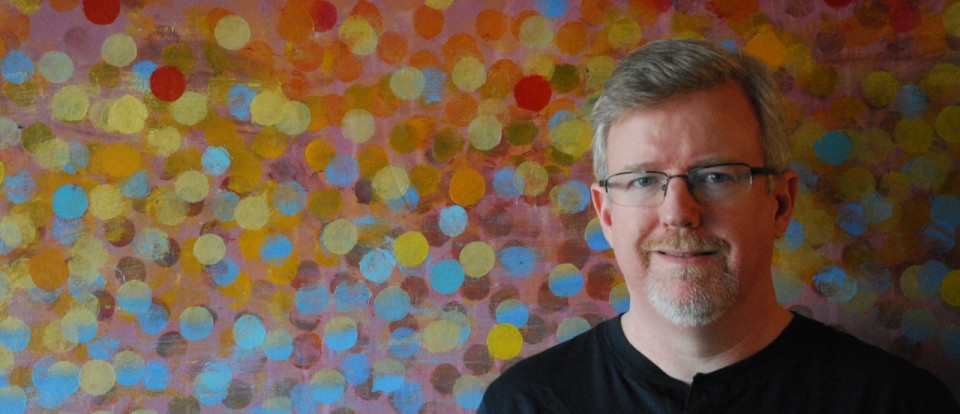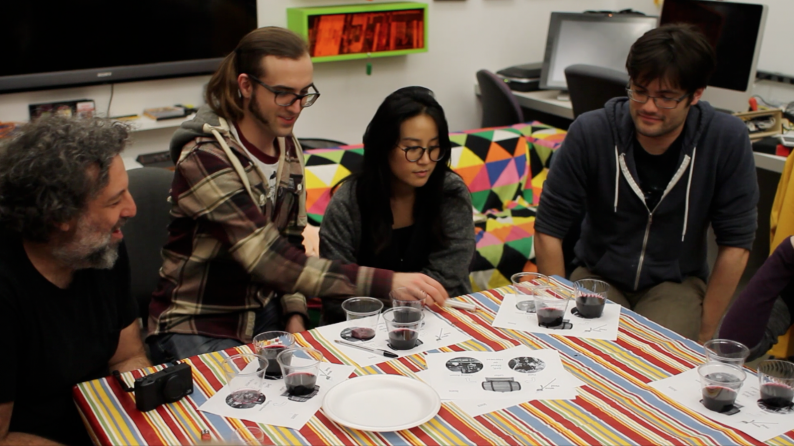
DAVID O’GRADY
Posted on November 21st, 2016
by Sofia Staab-Gulbenkian
David O’Grady
Age: Old Enough!
Hometown: Born in Oakland, grew up in Kansas City
Prior Education: University of Missouri, B.A. in Journalism
Current City: Los Angeles, CA
Role in UCLA Game Lab: Game Lab Resident and Researcher
Games
4Square (2012)
Wine Thief (2015)
Selected Publications
“Playfully Subversive: the Many Roles of Adaptation in Making Games at the UCLA Game Lab.” Mediascape, Fall 2014.
“Movies in the Gameworld: Revisiting the Video Game Cutscene and Its Temporal Implications.” In The Game Culture Reader, ed. Jason Thompson and Marc Ouellette. Cambridge Scholars Publishing. 2013.
“Biomechanics” and “Gestural Interfaces.” In Encyclopedia of Video Games: The Culture, Technology, and Art of Gaming. Greenwood/ABC-CLIO. 2012.
What are you doing now?
I am finishing my PhD dissertation in Cinema and Media Studies at UCLA about theories of video game interactivity and the implications of interface controller design and use on the experience of play. I’m fascinated by the aesthetics or “feel” of gameplay–and how human agency is enhanced and constrained in relationship to screen space through various devices. I am also a researcher at UCLA Game Lab and a lecturer at California State University-Long Beach.
How would you describe your experience at UCLA Game Lab?
In a videogame development landscape today that emphasizes commercial/technical training over artistic growth and experimentation, the UCLA Game Lab remains a special place–a room of one’s own–for game artists and game scholars alike. I highly value the lab’s organic, collaborative environment, cultivated by Eddo Stern and Tyler Stefanich; it has the right feel or “vibe” in which to explore game-making as an artistic practice, not a mass product. I also appreciate the lab’s emphasis on making complete games–and not on polishing technical game components or assets. What is so confounding in gaming these days is the emphasis on visual representation, when the medium of gaming is really only fully experienced in the ACT of play itself. I think the lab’s emphasis on developing games for actual play over all other considerations makes it indispensable to the future of the medium as a distinctive, interactive art form. Also, the UCLA Game Lab is the only lab I know of with a restaurant rating on Yelp.

What did you find valuable at UCLA Game Lab? What did you learn during your time here?
I appreciate the fact that the lab’s mission is in fact an accurate articulation of its values in daily practice. I think the lab offers game-makers a habitat, an incubator, for game ideas that remind us the medium is more than just exercises in mastery or flow. Games are an art form that possess a special power all their own; the lab is a fertile place to explore the breadth and depth of that power.
First, I’ve learned a great deal about developing my own games, and I’ve had the chance to playtest two of them with people in the lab–people who are deeply passionate about games. Perhaps more importantly for me, in my academic work, the lab provides direct access to the people and projects that are shaping the future of games as a vibrant and diverse medium. Guest demos and lectures, game jams, exhibitions, interviews… it has all proven invaluable to my writing and research!
What would you tell other prospective students about UCLA Game Lab?
I think the game lab is an ideal environment for student-artists who desire the opportunity (and responsibility) to work “across” a variety of artistic practices to create interactive, playful art. The meta-medium of games requires great flexibility and willingness to embrace the challenges and ambiguities of “new” or “fresh” mindedness (a condition which ever-changing, game-making toolsets and game-playing platforms often induce). Most importantly, the lab is a place for people who love the idea of pushing games into new concepts and spaces. I think anyone excited about working with innovative, interactive media–and willing to take on the thrilling and mystifying play impulse–should consider the lab a safe space for bold experimentation.
What do you want to do in the future?
Hopefully, teach new media and videogame history/theory/criticism as a tenured professor (assuming they still have those when I earn my degree!). And perhaps teach game making, too!
